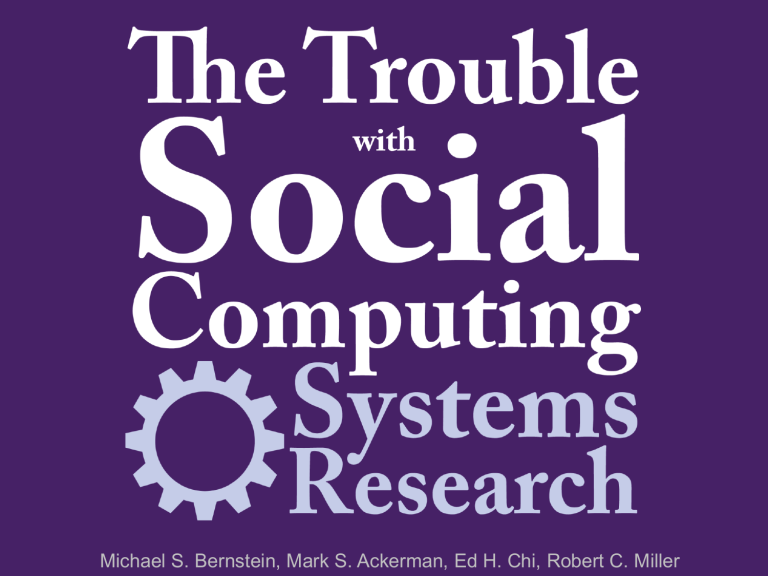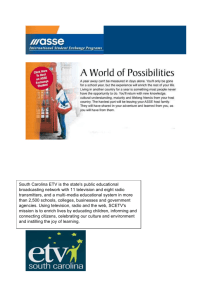Michael S. Bernstein, Mark S. Ackerman, Ed H. Chi, Robert...

Michael S. Bernstein, Mark S. Ackerman, Ed H. Chi, Robert C. Miller
Ratio of “Understanding Users” papers to “Systems, Tools, Architectures and Infrastructure” papers submitted to the Interaction Beyond the Individual track at CHI 2011.
Trouble: Exponential Growth
Your usage data is not really compelling because only a small fraction of
Facebook is using the application. Worse, your numbers – CHI metareviewer, paraphrased aren’t growing in anything like an exponential fashion.
Suggestion: Exponential Growth
Separate evaluation of spread from steady-state.
Which claim is the paper making?
Trouble: Snowball Sampling
The authors’ choice of study method – snowball sampling their system by advertising within their own social network – potentially leads to serious
Suggestion: Snowball in social systems. It is fundamental to how they operate.
Novelty
Between a Rock and a Hard
Science
sociotechnical
socio technical s
socio technical s
Fatal Flaw Fallacy
[Olsen]
Ecological validity at the cost of internal validity
[Ackerman 2000], [Barkhuus and Rode 2007], [Chi 2009], [Greenberg and
Buxton 2008], [Kaye and Sengers 2007], [Landay 2009], [Lieberman 2003],
[Olsen 2007], [Zhai 2003]
socio technical s
We let people type messages up to 140 characters.
That’s it? What is possible now that wasn’t before?
Nothing — but focus on emergent social activity.
Can you add multitouch?
Not using IE8.
Show us elegant complexity.
(simple ideas that enable complex scenarios)
socio technical builders
Build a technically interesting system
(that is hard to spread or evaluate), or
Simplify to a system with socially interesting outcomes
(that builders find less novel).
The contribution needs to take one strong stance or another. Either it describes a novel system or a novel social interaction. If it’s a system, then I question the novelty. If it’s a social
Build a technically interesting system
(that is hard to spread or evaluate), or
Simplify to a system with socially interesting outcomes
(that builders find less novel).
Create a shared understanding of research contributions
social technical
Shared organizational memory [Ackerman 1994]
Designs that impact social interactions
Increasing online contribution [Beenen et al. 2004]
Enable fluent social interaction in a new domain
Socially translucent systems [Erickson and Kellogg 2000]
social technical
Wikidashboard [Suh et al. 2008]; sense.us [Heer et al. 2007]
Algorithms to coordinate crowds or derive signal from social data
Collaborative Filtering [Resnick et al. 1994]; Iterate-and-Vote [Little et al. 2010]
Platforms and infrastructures
TurKit [Little et al. 2010]
technical value
ManyEyes
[ Viégas et al. 2007]
In conclusion introduction:
What are our millennium challenges?
What is our relationship with industry and walled gardens?
How can (and should) we evolve our standards of proof?
Michael S. Bernstein, Mark S. Ackerman, Ed H. Chi, Robert C. Miller
